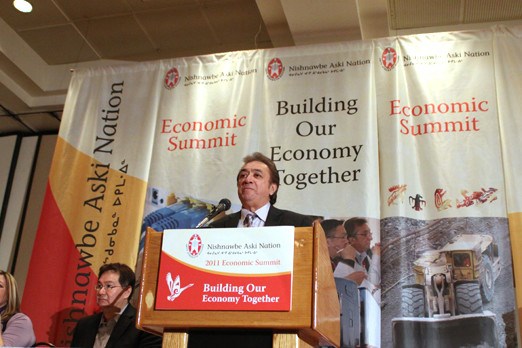First Nation communities haven’t been getting the benefits they should be from the resources extracted from their traditional territory.
Nishnawbe Aski Nation’s deputy grand chief Les Louttit said he hopes a NAN developed economic strategy will change that.
Nishnawbe Aski Nation began its first economic summit at the Valhalla Inn on Tuesday. The first day of the three-day summit opened with guest speakers and presentations from various Aboriginal organizations. NAN officials planned the summit with the Ministry of Aboriginal Affairs about a year ago in an attempt to develop an official economic strategy.
Louttit said First Nation communities have learned the hard way of what can happen if they’re not consulted when economic activity takes place within their traditional lands, and he said he won’t let that mistake happen again.
"To date, all this wealth extraction has eluded us," Louttit said. "We’re hoping to be changing that agenda with this conference so we will be in more control and hopefully receive more from the wealth extraction that takes place in our communities."
He said the consequence of lack of consultations with First Nation communities has already happened and that’s something everyone wants to avoid. With better communication, NAN could become an economic power especially in Northern Ontario.
There was a lot of interest from communities, industry players and the government to hold a summit and to develop an economic strategy, he said. NAN doesn’t have an economic strategy yet, but Louttit said he hoped by the end of the three-days they would be on their way to developing one.
"From the interest that has been shown, I can already see (this summit) as a success," he said. "We’re definitely going to have a bilateral process that we intend to follow with the Ontario government. Of course, also working with our Fist Nation communities because they are the ones that are going to give us the direction. That’s why they’re here today."
Louttit said he wasn’t worried about the upcoming provincial election, but hoped the government would continue to honour all negotiations even if there were drastic changes at Queen’s Park.
Jackie Fletcher, a spokeswoman with the NAN Oshkaatisak Women’s Council, said she wanted to make sure that women had a hand in developing the strategy. She added that women have always played a vital role in decision making in the past and should continue to do so.
"We use many skills when raising our families, which in turn could be transferred to the social and economic development of today," Fletcher said.
"It’s important that we’re a part of the economic engine because we know how to manage people and money. We know how to analyse, evaluate, organize, multi-task, trade, sell, make decisions for the betterment of all and least of all know how to get things done."
While still primarily seen as a man’s domain, Fletcher said women’s involvement in economic development has improved, but there’s still a long ways to go. Fletcher plans to pose a number of questions at the summit in the hopes that it will help cement the importance women play in the decision-making process.
Jocelyn Formsma, who holds the social justice portfolio with the NAN Oshkaatisak Young People’s Council, said the youth are the beneficiaries in any economic development so it’s important for them to have a say in any decision making.
"Ultimately, we’re working to have something for the next generation," Formsma said. "We’re the ones who will inherit it in the next decade or two. So by involving us now, we’re helping to build something that we can take care of later."
With a proper strategy in place, she said she hoped it will mean change. She hoped every community has a safe school for youth to go to, better social services to ensure families stay together and more opportunities for the community to grow through music and art.
“I believe economy is building community," she said. "By having a liveable community it means you have to have all parts represented not just people who have jobs. I think a lot of the NAN people are very gifted with music and art and have very brilliant ideas but don’t have the resources to implement those ideas."
The summit continues on Wednesday with registration at 8 a.m.
Sign in or register
- Messages
- Post a Listing
- Your Listings
- Your Profile
- Your Subscriptions
- Your Likes
- Your Business
- Support Local News
- Payment History
Registered Users
Already have an account?
New Users
Create a free account.
